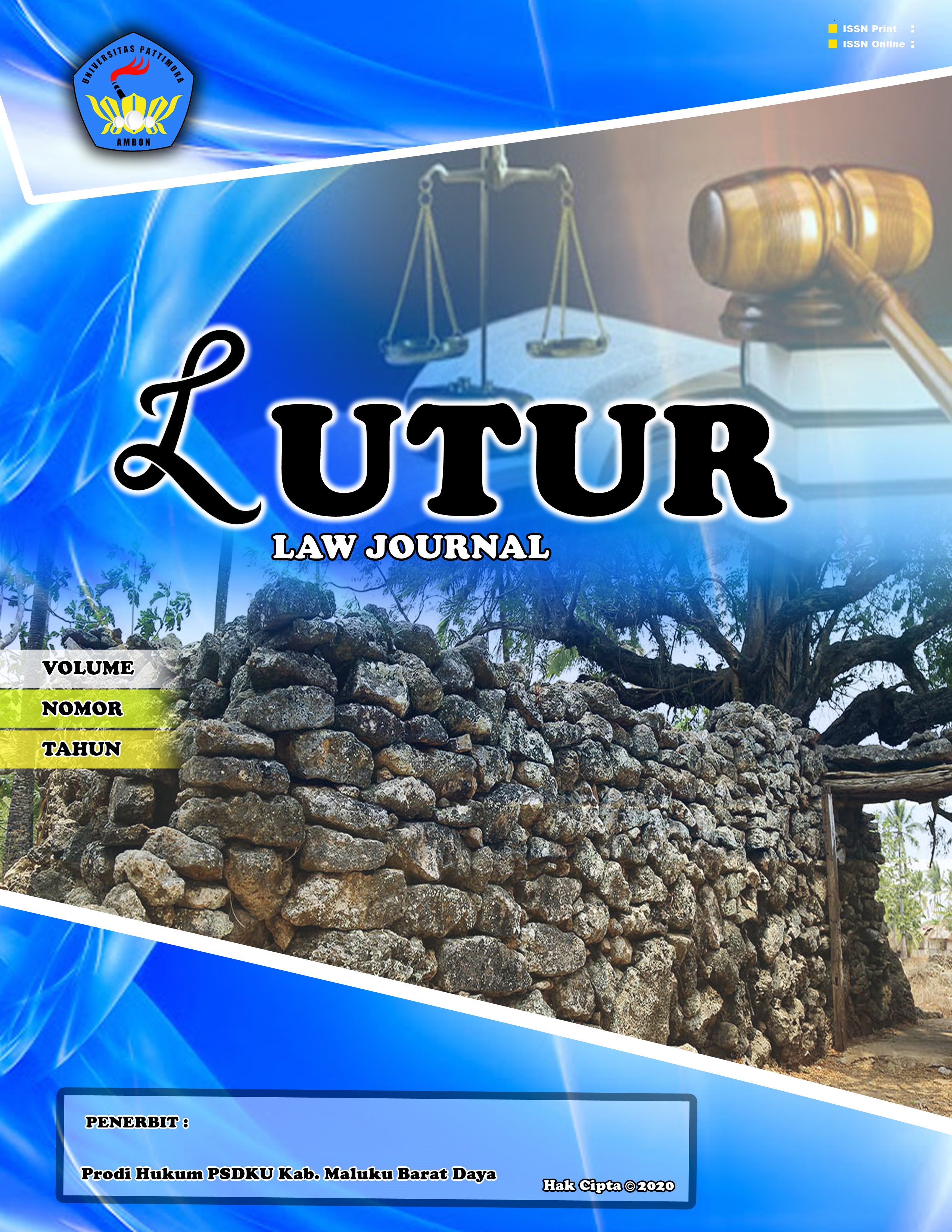Keadilan Restoratif Implementation of the Concept of Restorative Justice in the Settlement of Misdemeanor Crimes
Abstract
Restorative justice is an alternative approach in the criminal justice system that focuses on recovering losses suffered by victims, the responsibility of the perpetrator, and the involvement of the community in solving criminal acts. This approach does not focus on punishment, but on the restoration of relationships damaged by crime and participatory settlement between victims, perpetrators and social communities. The unity of the indigenous peoples of Southwest Maluku Regency adheres to the culture of Kalwedo and Snyoli Lyeta/Niolilieta/Hiolilieta/Siolilieta (coexistence well) as a culture that is also the highest guideline of life and kinship applied in daily life that regulates kinship relations between individuals and between families in the integrity of life as a customary community. This study is an Empirical Juridical Research that explores the issues through conceptual, statutory, and case approaches. Based on these methods, conclusions and recommendations are formulated. The research and analysis employ the framework of the Criminal Justice System, the concept of Restorative Justice, Indigenous Communities, and the Theory of Balance in assessing the implementation of restorative justice in resolving minor offenses. The findings confirm that in every minor criminal offense committed within the indigenous legal community of Southwest Maluku, axiological values namely the customary values of Kalwedo and Snyoli Lyeta/Niolilieta/Hiolilieta/Siolilieta take precedence over national criminal law (material criminal law). These values serve as legal principles to resolve the offense through non-penal means based on the concept of restorative justice, by imposing customary obligations that require the offender to compensate the victim. This form of simple justice, carried out through customary proceedings, aims to halt the formal criminal process, thereby reducing the burden on law enforcement subsystems and minimizing the state’s financial expenditure related to the prosecution and imprisonment of minor offenders.
Downloads
References
Achmad Ali. Menguak Teori Hukum (legal theory) dan Teori Peradilan (judicial prudence). Jakarta: Kharisma Putra Utama. 2013.
Adami Chazawi. Pelajaran Hukum Pidana, Bagian 1. (Stelsel Pidana, Tindak Pidana, Teori-Teori Pemidanaan dan Batas Berlakunya Hukum Pidana). RadjaGrafindo Persada. Jakarta 2001.
Barda Nawawi Arief, Bunga Rampai Kebijakan Hukum Pidana Jakarta: Prenadamedia Group, 2017.
E. Utrecht, Hukum Pidana I, Jakarta: Penerbit Universitas, 1986.
Leden Marpaung. Unsur-Unsur Perbuatan yang Dapat Dihukum. Jakarta: Sinar Grafika. 1991.
Lilik Mulyadi, Hukum Pidana dalam Perspektif Restorative Justice, Bandung: Citra Aditya Bakti, 2011.
Mardjono Reksodipoetro, Kriminologi dan Sistem Peradilan Pidana, Jakarta: Lembaga Kriminologi Universitas Indonesia, 1994.
Muladi, Kapita Selekta Sistem Peradilan Pidana, Badan Penerbit UNDIP, Semarang 2002.
-------------------. Sistem Peradilan Pidana Indonesia. Jakarta: Citra Baru., 1994.
Romli Atmasasmita, Rekonstruksi Teori Hukum Pidana Indonesia dalam Perspektif Restorative Justice, Bandung: Refika Aditama, 2012.
-------------------, Sistem Peradilan Pidana: Perspektif Eksistensialisme dan Abolisionisme (Jakarta: Prenadamedia Group, 2014).
Ronald Z. Titahelu. Penetapan Asas-Asas Hukum Umum Dalam Penggunaan Tanah Untuk Sebesar-Besarnya Kemakmuran Rakyat. Ambon: Deepublish-Budi Utama. 2015.
Soepomo, Bab-Bab tentang Hukum Adat, Jakarta: Pradnya Paramita, 2003.
Soerjono Soekanto, Pengantar Penelitian Hukum, Jakarta: UI Press, 1984.
Sudjito bin Atmoredjo (Guru Besar dan Ketua Program Pascasarjana Fakultas Hukum UGM). Negara Hukum Dalam Perspektif Pancasila. Makalah untuk Kongres Pancasila. Kerjasama Mahkamah Konstitusi RI dan Gadjah Mada. Tanggal 30 Mei - 1 Juni 2009. Balai Senat UGM Yogyakarta.
Syamsul Arifin, Pengantar Hukum Indonesia, Medan: Medan Area University Press, 2012.
Tony Marshall, Restorative Justice: An Overview, London: Home Office, 1999.
Yesmil Anwar dan Adang. Sistem Peradilan Pidana (Konsep, Komponen dan Pelaksanaannya dalam Penegakan Hukum di Indonesia). Bandung: Widya Padjadjaran. 2009.
Yeheskel Wessy, “Tinjauan Hukum Pidana Terhadap Denda Adat Menurut Nilai Kalwedo dan Snyoli Lyeta Di Desa Tounwawan Pulau Moa Kabupaten Maluku Barat Daya”, Jurnal; Lutur Law Jurnal 1, no. 2 (2021).
Copyright (c) 2025 Yeheskel Wessy (Author)

This work is licensed under a Creative Commons Attribution-NonCommercial 4.0 International License.
Authors who publish their manuscripts in this Journal agree to the following conditions:
- The copyright in each article belongs to the author, as well as the right to patent.
- Authors are able to enter into separate, additional contractual arrangements for the non-exclusive distribution of the journal's published version of the work (e.g., post it to an institutional repository or publish it in a book), with an acknowledgment of its initial publication in this journal.
- Authors are permitted and encouraged to post their work online (e.g., in institutional repositories or on their website) prior to and during the submission process, as it can lead to productive exchanges, as well as earlier and greater citation of published work.
- Authors have the right to self-archiving of the article (Author Self-Archiving Policy)














